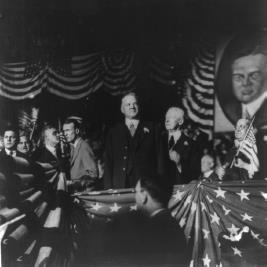Parties and PlatformsCampaigns and Nominations |
What is the concept of political bosses and smoked-filled rooms? |
In their early incarnation, national conventions were often unruly, strongly contested meetings, and frequently many ballots and extensive political maneuvering were required before a presidential candidate could be nominated. A political party’s nominee for president was often selected by influential party members and leaders (called “party bosses”) at the party’s national convention, after a lot of negotiation in “smoked-filled rooms”—where the air was filled with intrigue, not to mention cigar and cigarette smoke.
The term came into use at the 1920 Republican National Convention in Chicago, when Republicans met to select a front-runner for the presidential nomination. After the first day of balloting, the convention adjourned without a nominee from among the eleven candidates, forcing party leaders and U.S. senators to meet in a smoke-filled room at the Fair banks Hotel to choose a candidate. The result was U.S. senator Warren G. Harding of Ohio, a candidate acceptable to both the conservative and progressive wings of the party. Realizing that this was not a democratic method of choosing a major-party presidential candidate, the Democratic and Republican parties began opening up the process to voters through the primary and caucus system.

The nomination process that resulted in the Republicans naming Herbert Hoover as their candidate was so chaotic that it inspired changes that helped greatly democratize the process at the next Republican National Convention.
